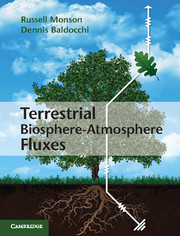Description
Terrestrial Biosphere-Atmosphere Fluxes
Authors: Monson Russell, Baldocchi Dennis
This book provides graduate students and researchers with tools to understand and quantitatively analyse biosphere-atmosphere fluxes of trace gases, water and energy.
Language: English
Subject for Terrestrial Biosphere-Atmosphere Fluxes:
98.14 €
In Print (Delivery period: 14 days).
Add to cart
Publication date: 03-2014
507 p. · 19.5x25.2 cm · Hardback
507 p. · 19.5x25.2 cm · Hardback
Description
/li>Contents
/li>Biography
/li>
Fluxes of trace gases, water and energy - the 'breathing of the biosphere' - are controlled by a large number of interacting physical, chemical, biological and ecological processes. In this interdisciplinary book, the authors provide the tools to understand and quantitatively analyse fluxes of energy, organic compounds such as terpenes, and trace gases including carbon dioxide, water vapour and methane. It first introduces the fundamental principles affecting the supply and demand for trace gas exchange at the leaf and soil scales: thermodynamics, diffusion, turbulence and physiology. It then builds on these principles to model the exchange of water, carbon dioxide, terpenes and stable isotopes at the ecosystem scale. Detailed mathematical derivations of commonly used relations in biosphere-atmosphere interactions are provided for reference in appendices. An accessible introduction for graduate students and a key resource for researchers in related fields, such as atmospheric science, hydrology, meteorology, climate science, biogeochemistry and ecosystem ecology.
Preface; List of symbols; 1. The general nature of biosphere-atmosphere fluxes; 2. Thermodynamics, work and energy; 3. Chemical reactions, enzyme catalysts and stable isotopes; 4. Control over metabolic fluxes; 5. Modeling the metabolic CO2 flux; 6. Diffusion and continuity; 7. Boundary layer and stomatal control over leaf fluxes; 8. Leaf structure and function; 9. Water transport within the soil-plant-atmosphere continuum; 10. Leaf and canopy energy budgets; 11. Canopy structure and radiative transfer; 12. Vertical structure and mixing of the atmosphere; 13. Wind and turbulence; 14. Observations of turbulent fluxes; 15. Modeling of fluxes at the canopy and landscape scales; 16. Soil fluxes of CO2, CH4 and NOx; 17. Fluxes of biogenic volatile compounds between plants and the atmosphere; 18. Stable isotope variants as tracers for studying biosphere-atmosphere exchange; References; Index.
Russell Monson is Louise Foucar Marshall Professor at the University of Arizona, Tucson and Professor Emeritus at the University of Colorado, Boulder. His research focuses on photosynthetic metabolism, the production of biogenic volatile organic compounds and plant water relations from the scale of chloroplasts to the globe. He has received numerous awards, including the Alexander von Humboldt Fellowship, the John Simon Guggenheim Fellowship and the Fulbright Senior Fellowship, and was also appointed Professor of Distinction in the Department of Ecology and Evolutionary Biology at the University of Colorado. Professor Monson is Editor-in-Chief of the journal Oecologia, has served on advisory boards for numerous national and international organisations and projects, and has over 200 peer-reviewed publications.
Dennis Baldocchi is a professor of Biometeorology at the University of California, Berkeley. His research focuses on physical, biological and chemical processes that control trace gas and energy exchange between vegetation and the atmosphere and the micrometeorology of plant canopies. Awards received include the Award for Outstanding Achievement in Biometeorology from the American Meteorological Society (2009) and the Faculty Award for Excellence in Postdoctoral Mentoring (2011), amongst others from the University of California. Professor Baldocchi is a Fellow of the American Geophysical Union and is a member of advisory boards for national and international organisations and projects. He is Editor-in-Chief of the Journal of Geophysical Research: Biogeosciences and has over 200 peer-reviewed publications.
Dennis Baldocchi is a professor of Biometeorology at the University of California, Berkeley. His research focuses on physical, biological and chemical processes that control trace gas and energy exchange between vegetation and the atmosphere and the micrometeorology of plant canopies. Awards received include the Award for Outstanding Achievement in Biometeorology from the American Meteorological Society (2009) and the Faculty Award for Excellence in Postdoctoral Mentoring (2011), amongst others from the University of California. Professor Baldocchi is a Fellow of the American Geophysical Union and is a member of advisory boards for national and international organisations and projects. He is Editor-in-Chief of the Journal of Geophysical Research: Biogeosciences and has over 200 peer-reviewed publications.
© 2024 LAVOISIER S.A.S.




